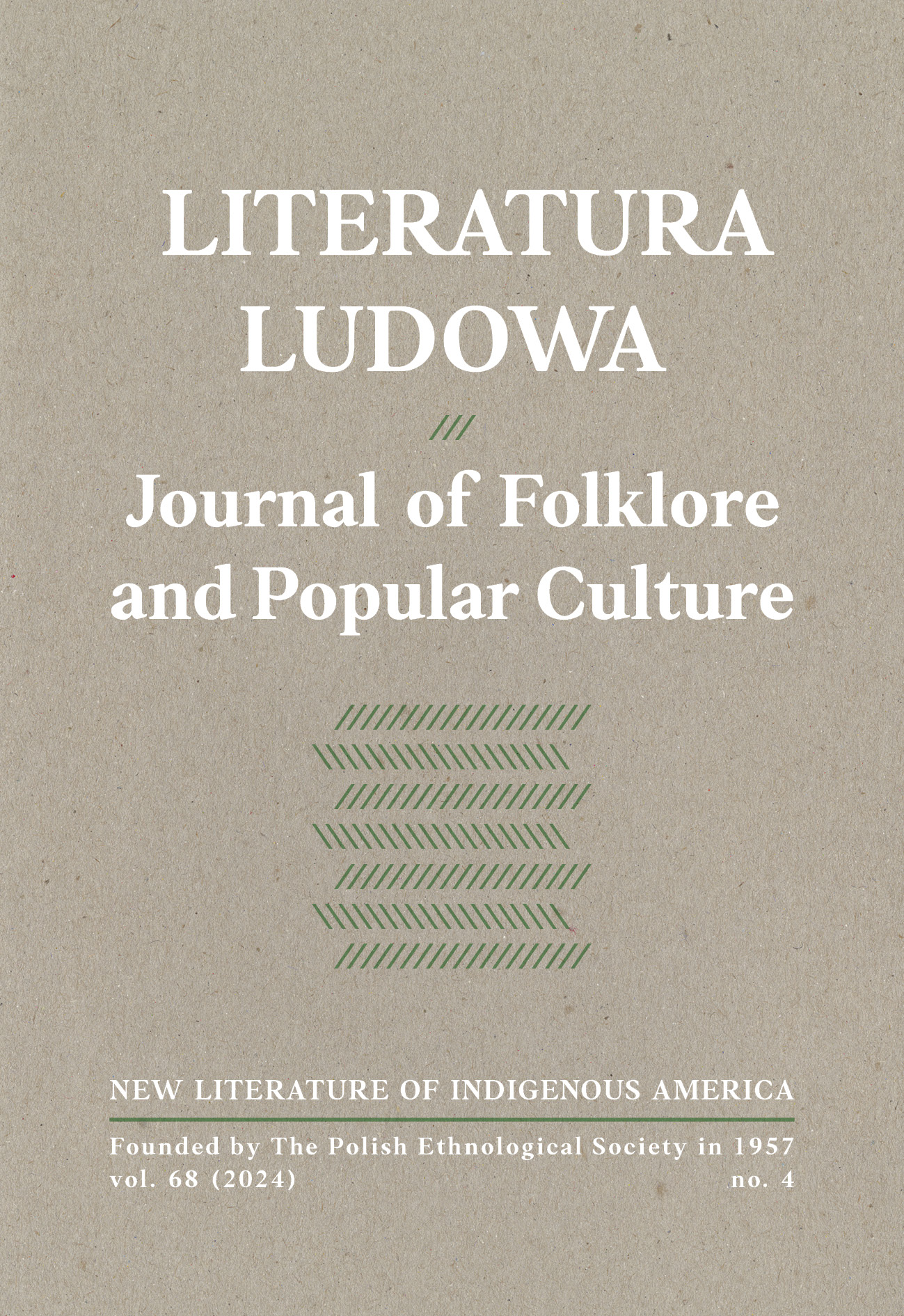„Wyznaczając ścieżkę z mapy na ląd”. Suwerenność cielesna w esejach Billy’ego-Raya Belcourta A History of My Brief Body
DOI:
https://doi.org/10.12775/LL.4.2024.005Palabras clave
ciało, ucieleśnienie, dekolonizacja, erotyka, suwerennośćResumen
Autorka artykułu analizuje sposoby, w jakich pisarz z narodu Driftpile Krii w Północnej Albercie, Billy-Ray Belcourt, wykorzystuje ciało i ucieleśnione doświadczenia, by stworzyć teoretyczne ramy dla dekolonizacji pojęć, takich jak seksualność, erotyzm i suwerenność. Według Belcourta indygeniczne ciało zostało nie tylko skolonizowane i ograniczone przez heteronormatywność osadników kolonialnych, ale również zignorowane przez rodzimych krytyków, artystów i pisarzy jako nieistotne w porównaniu z teorią indygeniczności. Dlatego w swoich tekstach Belcourt podkreśla centralną rolę ciała jako ramy teoretycznej, a także źródła (seksualnej) przyjemności w codziennym życiu. Opowiada się za „rdzenną radością”, która afirmuje tożsamości tubylczych mieszkańców we wszystkich ich wymiarach, w tym osób o dwóch duszach (ang. Two-Spirit) i queer, zapewniając im tym samym emocjonalne wsparcie w codziennej walce z przejawami kolonializmu osadniczego.
Citas
Akiwenzie-Damm, K. (2000). Without Reservation: Erotica, Indigenous Style. Journal of Canadian Studies/Revued’Etudes Canadiennes, 35(3), 97–104.
Belcourt, B. (2016). Masturbatory Ethics, Anarchic Objects: Notes on Decolonial Love [unpublished work]. Education and Research Archive University of Alberta. https://doi.org/10.7939/R3G73756S
Belcourt, B. (2017a). Indigenous Studies Beside Itself. Somatechnics, 7(2), 182–184.
Belcourt, B. (2017b, 4 August). The Body Remembers When the World Broke Open. Arts Everywhere. https://www.artseverywhere.ca/body-remembers-world-broke-open/
Belcourt, B. (2020). A History of My Brief Body. Two Dollar Radio.
Belcourt, B., Nixon, L. (2017, 32 May). What Do We Mean by Queer Indigenous Ethics? Canadian Art. https://canadianart.ca/features/what-do-we-mean-by-queerindigenousethics/
Colbert, J. (2021, 2 January). Cree Poet Billy-Ray Belcourt’s Memoir Imagines a More Intersectional Future. Globe & Mail. https://www.theglobeandmail.com/arts/books/article-so-muchhas-to-be-shaken-up-cree-poet-billy-ray-belcourts-memoir/
Cvetkovich, A. (2021). This Wound Is a World by Billy-Ray Belcourt. Native American and Indigenous Studies, 8(1), 227–228.
Duran, E., Duran, B., Yellow Horse Brave Heart, M., Yellow Horse-Davis, S. (1998). Healing the American Indian Soul Wound. In Y. Danieli (ed.), International Handbook of Multigenerational Legacies of Trauma (pp. 341–354). Plenum Press.
Gersie, J. (2021). Billy-Ray Belcourt. A History of My Brief Body. Transmotion, 7(1), 238–240.
Johnson, J. (2015). Black Joy in the Time of Ferguson. QED: A Journal in GLBTQ Worldmaking, 2(2), 177–183.
Lethabo King, T. (2019). The Black Shoals: Offshore Formations of Black and Native Studies. Duke University Press.
Lorde, A. (2015). Siostra outsiderka. Eseje i przemówienia (tłum. B. Szelewa). Wydawnictwo Czarna Owca.
Recollect, K. (2015). For Sisters. In D. Hayden Taylor (ed.), Me Artsy: An Exploration of Contemporary Native Arts (pp. 91–104). Douglas & McIntyre.
Simpson, L. B. (2015). The Place Where We All Live and Work Together: A Gendered Analysis of ‘Sovereignty’. In S. N. Teves, A. Smith i M. H. Raheja (eds.), Native Studies Keywords (pp. 18–24). The University of Arizona Press.
Simpson, L. B. (2017). As We Have Always Done: Indigenous Freedom Through Radical Resistance. University of Minnesota Press.
Warrior, R. (2008). ‘Your Skin Is the Map’: The Theoretical Challenge of Joy Harjo’s Erotic Poetics. In C. S. Womack, D. Heath Justice, C. B. Teuton (eds.), Reasoning Together: The Native Critics Collective (pp. 340–352). University of Oklahoma Press.
Wilson, A. (2015). Our Coming In Stories: Cree Identity, Body Sovereignty and Gender Self-Determination. Journal of Global Indigeneity, 1(1), 1–5.
Descargas
Publicado
Cómo citar
Número
Sección
Licencia
Derechos de autor 2025 Joanna Ziarkowska

Esta obra está bajo una licencia internacional Creative Commons Atribución-SinDerivadas 4.0.
1. The authors give the publisher (Polish Ethnological Society) non-exclusive license to use the work in the following fields:a) recording of a Work / subject of a related copyright;
b) reproduction (multiplication) Work / subject of a related copyright in print and digital technique (ebook, audiobook);
c) marketing of units of reproduced Work / subject of a related copyright;
d) introduction of Work / object of related copyright to computer memory;
e) dissemination of the work in an electronic version in the formula of open access under the Creative Commons license (CC BY - ND 3.0).
2. The authors give the publisher the license free of charge.
3. The use of the work by publisher in the above mentioned aspects is not limited in time, quantitatively nor territorially.
Stats
Number of views and downloads: 311
Number of citations: 0



